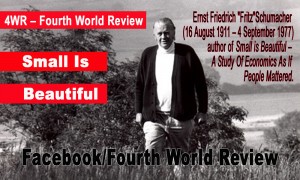Regionalism – Small Is Beautiful!

Artwork produced by the long-standing and well-respected publication Fourth World Review – 4WR. This artwork celebrates the life of Ernst Friedrich "Fritz" Schumacher, who wrote the book Small Is Beautiful: A Study of Economics As If People Mattered. We would encourage all those interested in regionalism to read it.
THE NATIONAL LIBERAL PARTY is well-known for its stance on self-determination. As our web-site – http://nationalliberal.org/ – notes, the principle of self-determination ‘can be applied largely in three areas; National, Political and Economic.
National Self-Determination seeks to ensure decisions affecting the collective future of a nation are taken by ALL the people via referendum. This may be ‘External’, for example: the creation or maintenance of a nationstate, or ‘Internal’ – framing/updating a constitution to reflect how a people should rule themselves. (We favour independent nations and liberal, democratic, states).
Political Self-Determination seeks to ensure that the collective will of the people as well as the variety of political opinion is reflected in decision making. Thus, for example, we favour greater use of referendums to meet the former, and PR to reflect the latter (we favour a system close to the Swiss model of Direct Democracy).
Economic Self-Determination seeks to distribute ownership as widely as possible and as close to the individual as practical by favouring home owndership, self-employment, small businesses, cooperatives and employee shareholdings. (We believe that ownership is the key to economic and social health: where workers obtain a just reward for their labours and gain a feeling of well-being through their having a genuine personal stake in society).
The above principles underpin many National Liberal policies but others are rooted in common sense and usually aim to strike a balance between conflicting opinions, as befits a centrist party.’
With the above in mind, it follows that National Liberals favour decentralisation – and our idea is to decentralise power down to the lowest possible level. Indeed, early last year the NLP produced this artwork http://nationalliberal.org/the-national-liberal-party-supports-decentralisation to promote the idea of decentralisation.
‘All through history man has quested for democracy and largely he has failed; in the past it has often been because of military dictatorship and tyranny, but in modern times this factor has been abetted by another, one still mainly unrecognised, that of size.
It was unrecognised that as an electorate grew in size the power passed from individual members to party machines. Nor did it stop there; with the development of mass newspapers, of radio and of television, new forms of power, new ways of influencing popular thinking emerged which ensured that the electorate did not so much control the government but rather the government controlled the electorate.
So great has been the power of the media that it has reached a stage where boardroom ownership power, coupled with the boardroom power of private investment and banking, today largely controls the power of government. This is clearly expressed in the modern development of a united EUrope in defiance of the general will, and which all the major parties are afraid to oppose. The way forward is not through mass party machines, but through the development of local community governing powers to a maximum level to ensure we have government not from the top down but as much as possible from the base up. A Fourth World of peoples’ power.’
In future articles relating to the issue of regionalism, we hope to provide information on both the historic regions of our nations and ways in which we can develop ‘local community governing powers’ such as building an alternative economy, media, culture and other vital services.
Date: March 26, 2018
Categories: Articles































